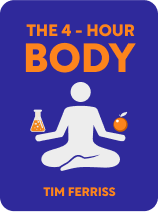

This article is an excerpt from the Shortform book guide to "The 4-Hour Body" by Timothy Ferriss. Shortform has the world's best summaries and analyses of books you should be reading.
Like this article? Sign up for a free trial here .
What is 4HB and what does it stand for? How do you implement 4HB in your life?
4HB is the term for the lifestyle shared in The 4-Hour Body by Tim Ferriss. By applying the principles to your life, you can see a drastic change in your body and its performance.
Keep reading for more about the 4HB lifestyle and what it might mean for you.
The 4HB Lifestyle
The 4-Hour Body (4HB) is an experimental lifestyle with the goal of finding out what makes your body work best. Author Tim Ferriss has been living this lifestyle for years. In The 4-Hour Body, he shares what he’s learned about his own body from researching scientific literature, interviewing experts, and self-experimentation. The book’s title comes from a 28-day experiment in which he spent only four hours total in the gym but lost three pounds of fat, gained 34 pounds of muscle, and decreased his total cholesterol.
Ferriss covers six topics for 4HB:
- Body recomposition (changing the percentages of your body that are made up of muscle vs. fat)
- Enhancing sex
- Improving sleep
- Preventing and recovering from injuries
- Improving sports-specific skills
- Living longer
While everyone’s body is different, much of what the author discovered is broadly applicable to most people, so you can use his recommendations as a starting point and inspiration for your own self-experimentation. His suggestions are small, straightforward, and easy to adhere to. You’ll see results so quickly that you won’t need any self-discipline—if a technique is obviously creating results, it’s easy to be motivated to keep doing it.
There are four rules to using the book (or summary):
- Don’t read the whole thing all at once. Start by choosing only one performance goal (for example, learn to swim) and one appearance goal (for example, lose 20 pounds).
- Don’t worry if you don’t understand the science behind the author’s recommendations—if you follow them, you’ll still get results.
- Maintain healthy skepticism. While all the strategies in the book will get you results, the author’s explanation of why may not be correct—50% of what humans know about the universe is wrong. However, don’t be so skeptical you don’t try anything.
- Be entertained. The reading experience should be fun.
(Shortform note: We recommend consulting your doctor before starting any of the book’s programs or self-experimenting.)
The Value of Self-Experimentation
Some scientists endorse self-experimentation. It has several advantages in 4HB compared to conventional scientific research because it’s:
- Fast-paced. When you have an idea about how to improve some element of your life, you can quickly make a change and observe the results. A single scientific study, on the other hand, takes a long time to get started because it requires extensive funding, which is time-consuming to secure. Additionally, it takes it years after a study is completed for the research to be replicated and officially endorsed.
- For example, the Food and Drug Administration is 10 years behind published research and 20 years behind evidence.
- Unbiased. Self-experimentation can focus on simple solutions, such as diet or sleep, which have been around since the Stone Age. Conventional research tends to focus on more complicated solutions, such as drugs, because drug companies will fund this work.
- For example, dermatologists are focused on the use of drugs to improve acne, even though there’s compelling evidence that diet changes might improve it.
- Lead by people who are strongly motivated. Self-experimenters are motivated by the desire to improve their lives, which is a powerful driver. Conventional researchers, on the other hand, are usually motivated by other goals, such as keeping their jobs, regularly publishing papers, getting funding, or obtaining status.
- Far-reaching. Whenever you make a change to your lifestyle, you see corresponding changes in your body, some of which you might not have predicted. These changes can lead you to new discoveries and experiments.
- For example, Seth had been having trouble sleeping for years. When he changed what he ate for breakfast for unrelated reasons, he found that eating fruit instead of oatmeal made him sleep worse and that he slept better when he didn’t eat breakfast at all.
- Multi-disciplinary. As a self-experimenter, you can combine theories from different fields and take more factors into account than a narrow scientific study.
- For example, doctors never consult bodybuilders about the impacts of testosterone, and bodybuilders don’t always talk to doctors either. They could learn from each other, but they don’t, and the field of performance enhancement is held back.

———End of Preview———
Like what you just read? Read the rest of the world's best book summary and analysis of Timothy Ferriss's "The 4-Hour Body" at Shortform .
Here's what you'll find in our full The 4-Hour Body summary :
- How to do the least amount you need to do for the results you want
- Why you need a cheat day in your diet
- How to improve everything about your body, including sleep, sex, and longevity






